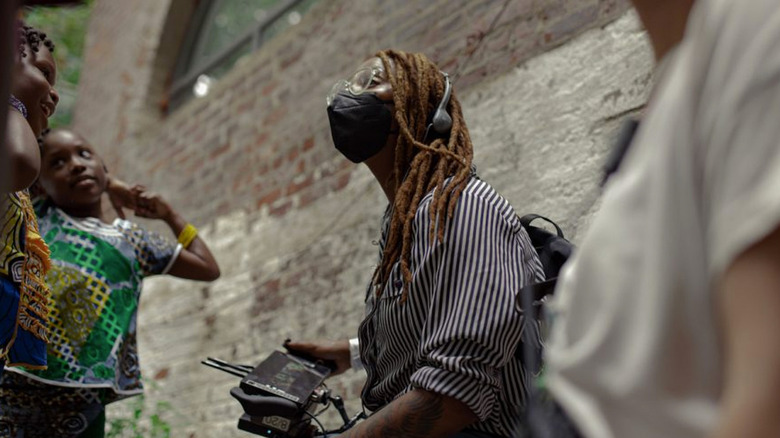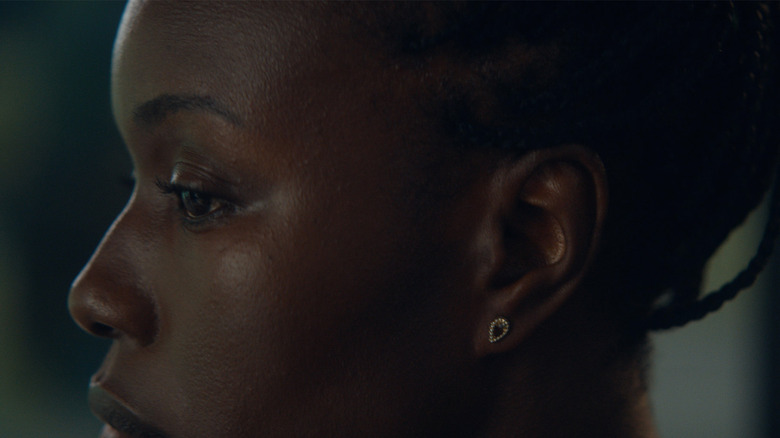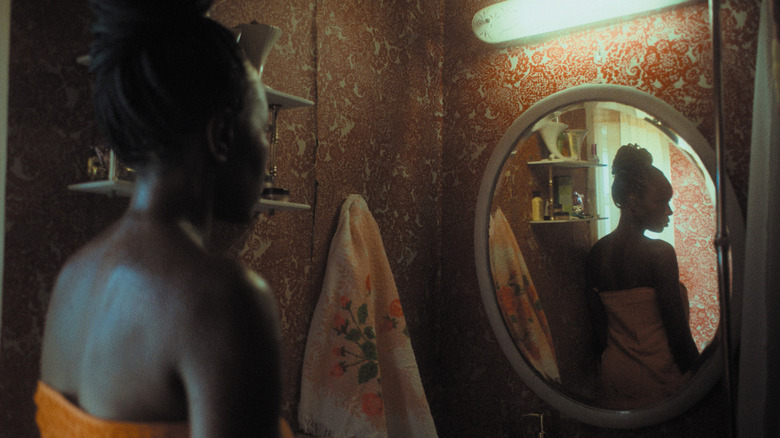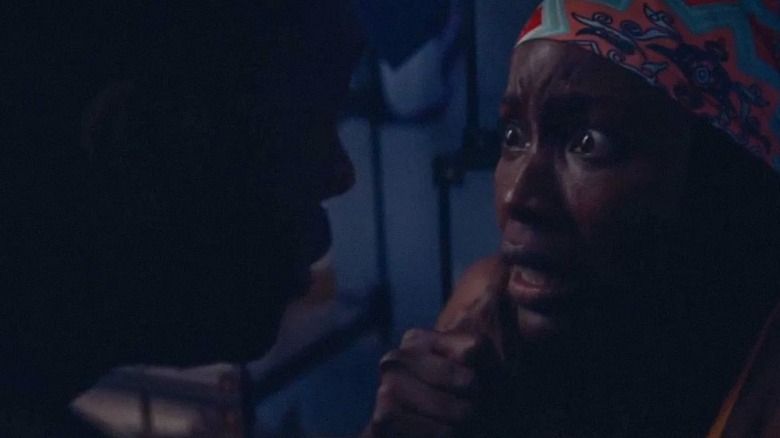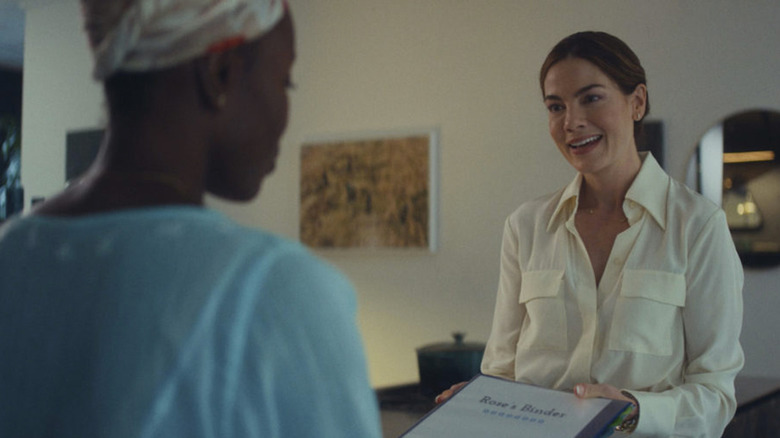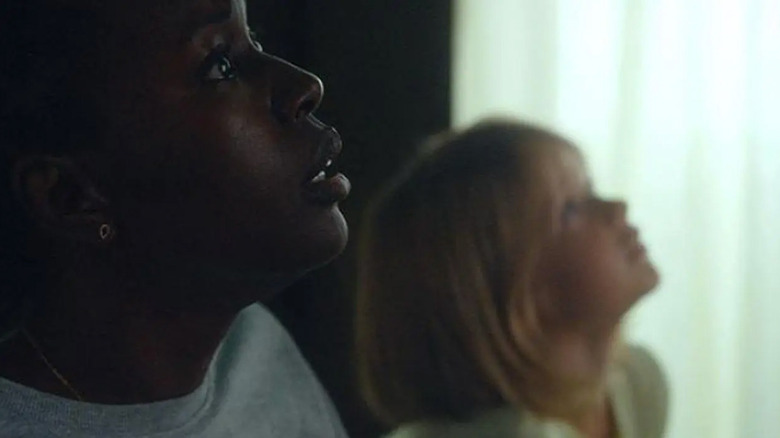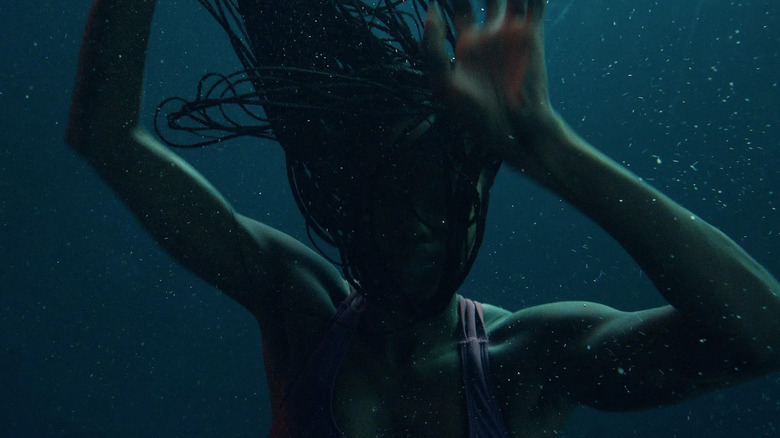Nanny Director Nikyatu Jusu Harnesses Horror For The Black Final Girls [Exclusive Interview]
Life in the film industry is disproportionately different for marginalized filmmakers, not in the least for Black women. But we're living in a time where the conversation surrounding those differences, and the difficulties that can arise from them, is becoming more transparent — and "Nanny" director Nikyatu Jusu is just one of the voices contributing to the conversation. Jusu has been grinding toward her debut feature for something like 15 years. As it is for so many filmmakers, grabbing the attention of a gratuitously gatekept industry wasn't an easy feat. But the work that she's cultivated in the interim has cut through the noise where it counts.
Still, it's hard to say if anything could have prepared Jusu for the incredible success of "Nanny." By all accounts, the film was a trial by fire: Production began in the midst of the pandemic and just barely wrapped in time for the 2022 Sundance Film Festival. After that fateful premiere in January, though, everything changed. "Nanny" came away with the Grand Jury Prize in the US Dramatic Competition; a distribution deal came shortly after, and now Jusu is one of the most promising new directors to watch.
It's been a whirlwind year for Jusu — and if you weren't paying attention, it'd seem like her success came out of nowhere. But nothing comes from nothing. It took a while to establish herself as an "undeniable" presence in Hollywood, but if Jusu's work ethic is any indication, she's definitely here to stay.
I recently spoke to Jusu all about "Nanny," the importance of creative partnerships, and the task of innovating a genre like horror.
'The industry has to pay attention to me. They have no choice at this point'
At the beginning of the year, "Nanny" was recognized with this huge honor. That, in turn, created this watershed opportunity for the film. How do you feel about it all now at the end of the year, and how has it informed your moves as a filmmaker?
Oh, my God. Sundance has been so good to me. They really just set the tone at the top of the year in terms of ushering me into the pearly gates. Had we not won the Grand Jury Prize, I think my year would've looked very different.
I'm really indebted to Michelle Satter, who leads all of the development programs at Sundance. They've become my surrogate family. I really am immersed in that community. It's been really affirming and validating, in terms of my trajectory, because I've been grinding for a really long time. But they set the tone and they made it undeniable that the industry has to pay attention to me. [Laughs] They have no choice at this point.
I feel some of the reviews this year have been ... Some people, you can tell if they feel they're being held at gunpoint to review the film. But it's good, because people have to be forced to review films that they typically would've overlooked — but they had to pay attention to some of us this year. I've been really thankful for that.
It reminded me a lot of when "Ganja & Hess" came out—
Ooh!
So many critics were like, "I don't get it."
Lyv, they gave me a heads up for my second interview today that I have to talk about my five favorite films. I hate lists, because we change every second. My five favorite films from second to second is five different films. But "Ganja & Hess" is one that I'm debating whether to mention. Bill Gunn, just reading through his interviews has been also really affirming, because he navigated almost exactly the same thing that I'm navigating now.
You've spoken a lot about the pitfalls of relying on these institutions that may or may not give worthy creators their due. I feel it's such an exercise in patience and trust. Not in the system, per se, but in yourself, in what you've built and what you're manifesting.
That's true. I agree with that.
'I wanted it to utilize the elements of darker genres like horror'
You were developing this project for a long time. When did the first spark of inspiration come?
It was something I was kicking around. The way that I nurture ideas is that I have all these folders, color-coded folders. If something really piques my interest, I'll create a folder for it. Nothing may be in the folder yet, but if I get signs from the universe in the form of news articles or current events, or just something that informs the spark of the idea, I'll throw it into the folder.
My mother did some domestic work, but it wasn't something ... I made other films, and I thought other ideas would be my first feature. But I kept revisiting this idea of a domestic worker, an African woman in America, and I knew I didn't want it to be framed in a straightforward drama. I knew I wanted it to utilize the elements of the darker genres like horror and thriller elements.
It was something that gestated for eight-ish years — is what I've been telling people, which is about right, maybe a little longer ... It's hard to quantify the seeds of an idea; the time that the first origin of that idea comes to you.
I was born and raised in Atlanta, Georgia, where you drive to your destination, you get out of your car and you walk into a building for most of your journey. But in New York, everything is very on the surface and visible, because it's a walking city and people take public transportation much more and things are proximal, so you see everything on the surface. And so getting to NYU and being in the area of Tisch — that Broadway, West 4th area — you see all these nannies pushing mostly white children in the city. Black and brown nannies. It was like a visual affirmation. I started formally writing the project, outlining the project, researching nannies in New York City. That was the catalyst for me to actually start putting pens and paper for the concept, which was, I would say, around 2006, 2007-ish.
Wow.
Yeah. So it's definitely more than eight years. [Laughs] But I revisited other projects. I started, then I would stop and revisit other projects.
It wasn't 15-plus years of stressing.
No, it wasn't consecutive. I always want to make that clear. My attention span is terrible. I would stop that and go to something else and come back.
'I just love seeing Black final girls and Black final women centered in the darker genres'
I wanted to talk about how you weaved folklore and myth into this narrative, given the reality that Aisha faces in her day to day is a horror story unto itself. Can you talk a little bit about what the supernatural lent to the story?
I don't see Black women centered in fantasy enough, for me as a Black woman viewer and consumer of content. I found that it was always easier to find the protagonists that I yearn for in novels — like Octavia Butler, Toni Morrison ... I wanted to translate that to the screen, because apocalyptic and dystopic worlds are really interesting to me, and fantasy, and the ways that the monster is an externalization of the protagonist's interior journey. But I knew I didn't have so many examples of that in a Black woman protagonist, so I think about Kasi Lemmon's first feature, "Eve's Bayou." I think about "The Girl With All the Gifts," which came later, in terms of the zombie canon centering a Black girl.
I just love seeing Black final girls and Black final women centered in the darker genres. So I knew I wanted to incorporate West African folklore, and I knew I wanted to navigate horror elements that felt culturally specific to my lineage as a Sierra Leonean American. Being African and being American, you're in this liminal in-between space all the time. You're not American enough, you're not Black American enough, you're not African enough. All of those elements, as a first-gen Black American, spoke to the way that I knew I wanted to execute this.
I'm not cocky enough to say that I'm creating a new language. There's so many people before me — Bill Gunn is one. It was so nice that you introduced him to this conversation because, at the time, him navigating Black vampires was unheard of. He was misinterpreted, overlooked, and ignored. So thinking about the ways other Black filmmakers have tried to innovate genres that we typically don't get entryway into, really just empowered me, digging into the archives and thinking about these other filmmakers. All of those things were things that I was thinking about.
'Having a partner who you trust ... has been really important to maintaining the creative vision'
At the risk of gushing, you're a filmmaker that I really look up to, in terms of resolve and your refusal to compromise. How did you ensure that "Nanny" stayed true to your vision, through every step of the process?
You know, I have to shout out my producing partner, Nikkia Moulterie. She has been a pivotal element for me. I went to film school; I was surrounded by directors, really talented filmmakers. Chloe Zhao went to NYU when I was there. I could name 12 filmmakers that are young filmmakers thriving right now. I was immersed in writer-directors in New York. But the thing that we're all often missing is a producing partner who truly wants to produce — doesn't secretly want to write, doesn't secretly want to take your spot as a director. Truly wants to bring your vision to life. That's what I found in Nikkia.
She was brought to a barbecue randomly by a classmate at NYU ... and we started talking and she was like "Yeah, I want to produce." I said, "Okay. She seems serious about this and she seems she has the skill set that speaks to a strong producer." She's Jamaican-American. Her mother had done some domestic work. So we just started talking about themes and ideas that resonated with both of us. That was the catalyst, really, in terms of realizing that my ideas were not just theoretical, that we could actually make them tangible with the right team.
She became my partner and she forced me to finish drafts that she could budget, that she could really visualize in terms of resources. She's so good at that. We got into the Sundance Labs. I'm fast-forwarding a lot, but she got into the Producing Lab with "Nanny." I got into the Screenwriters Lab with "Nanny," then I got into the Directors Lab with "Nanny." It's really rare to go through all the different labs with the same script and the same project.
But she was the catalyst, and she's been my partner through this entire process. When I'm killing myself doing one part of the process, she's killing herself doing another part of the process. But I trust her wholeheartedly — because you can't do everything. You can't do quality control for every step of the process when you're one human being, it's impossible. Having a partner who you trust, who can take the baton when you don't have the bandwidth, has been really important to maintaining the creative vision that we had for "Nanny."
'I want to work with [Anna] for the rest of my career'
I'd be remiss if I also didn't bring up your beautiful dynamic with [actress] Anna [Diop]. We spoke a few weeks ago and you can really tell what this experience means to her, and this partnership, too.
Lyv, Anna has been a blessing. Again: I think if you stay true to yourself, no matter how long it takes, if you have the tenacity and the stubbornness, if you stay true to your internal compass and your center, other people with that same internal compass and center gravitate to you. Like a moth to a flame, you gravitate to each other. She's someone who I love working with, I want to work with for the rest of my career. She's really about the work and the craft. There are a lot of people in this industry who are here for clout, the photo shoots, the parties, and aren't really about the work. And she's one of those few actresses who has all of these variables: the look, the depth, the range, the work ethic. It's hard to find those intersections in this industry, especially because it's capitalism. Some people become commodified and they become a product. Some people enjoy getting dressed up and doing [it], which is fine if you enjoy that. But if that's the only part that you're working towards and not to doing your best work on the screen or for a project, then it shows. She really is about the work.
'Marvel is a thing that filmmakers have to think about now'
I know you've spoken a bit about making a Storm movie with Anna one day.
Yes!
I don't how much you've thought about it, but how would you want to approach making something that's so firmly fixed in the public consciousness?
[Laughs] An answer to your question that was kind of rhetorical: I haven't thought deeply about it. It's been more about us, like ... Marvel is a thing that filmmakers have to think about now: the bigger franchises, the bigger IP of superheroes. I've been approached by IP that doesn't feel organic to me. It doesn't feel like I can contribute to it. Making something that is inherently white [into something] Black is not always my jam. I think it can work for certain projects. But with superheroes, Storm is one of the few who, in her origins, is an African woman. She's one of the few mainstream superheroes we have who's a Black woman from the beginning and is not being Black-washed into white IP. That's why she feels the most organic way in to superhero fodder.
I'm interested in superhero fodder, but she just feels like the right way in. Anna possesses the attributes that I think speak to that type of a character. She's athletic, she's smart, she is graceful, she's gorgeous. She has a lot of variables that speak to a Black woman superhero.
She's a living goddess, just as Storm is.
She really is! There are a few people who are, but she's one of the ones that just clearly is, in my opinion.
"Nanny" is in theaters now and arrives on Amazon Prime Video on December 16, 2022.
